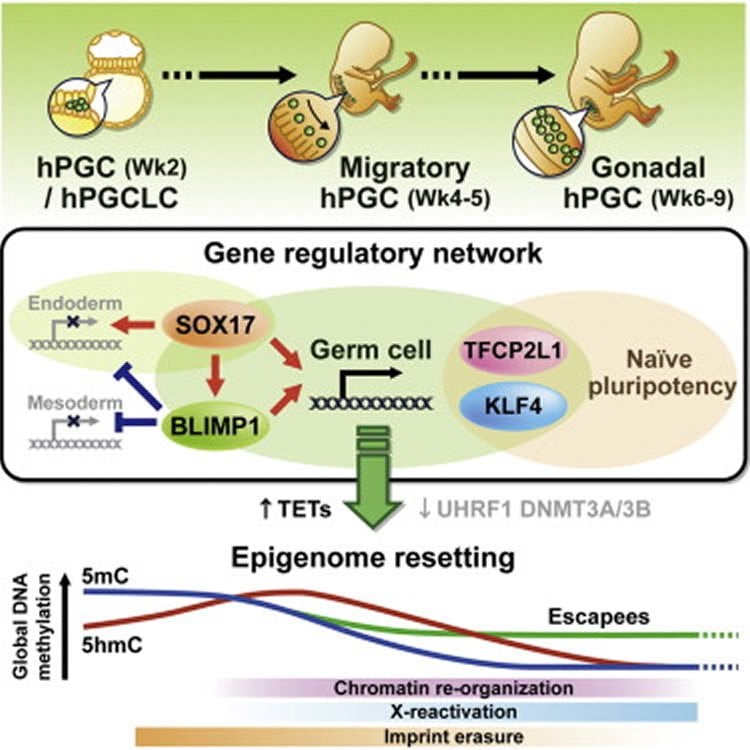A team of researchers led by the University of Cambridge has described for the first time in humans how the epigenome – the suite of molecules attached to our DNA that switch our genes on and off – is comprehensively erased in early primordial germ cells prior to the generation of egg and sperm. However, the study, published today in the journal Cell, shows some regions of our DNA – including those associated with conditions such as obesity and schizophrenia – resist complete reprogramming.
A team of researchers led by the University of Cambridge has described for the first time in humans how the epigenome – the suite of molecules attached to our DNA that switch our genes on and off – is comprehensively erased in early primordial germ cells prior to the generation of egg and sperm. However, the study, published today in the journal Cell, shows some regions of our DNA – including those associated with conditions such as obesity and schizophrenia – resist complete reprogramming.
Although our genetic information – the ‘code of life’ – is written in our DNA, our genes are turned on and off by epigenetic ‘switches’. For example, small methyl molecules attach to our DNA in a process known as methylation and contribute to the regulation of gene activity, which is important for normal development. Methylation may also occur spontaneously or through our interaction with the environment – for example, periods of famine can lead to methylation of certain genes – and some methylation patterns can be potentially damaging to our health. Almost all of this epigenetic information is, however, erased in germ cells prior to transmission to the next generation.
Professor Azim Surani from the Wellcome Trust/Cancer Research UK Gurdon Institute at the University of Cambridge, explains: “Epigenetic information is important for regulating our genes, but any abnormal methylation, if passed down from generation to generation, may accumulate and be detrimental to offspring. For this reason, the information needs to be reset in every generation before further information is added to regulate development of a newly fertilised egg. It’s like erasing a computer disk before you add new data.”
When an egg cell is fertilised by a sperm, it begins to divide into a cluster of cells known as a blastocyst, the early stage of the embryo. Within the blastocyst, some cells are reset to their master state, becoming stem cells, which have the potential to develop into any type of cell within the body. A small number of these cells become primordial germ cells with the potential to become sperm or egg cells.
In a study funded primarily by the Wellcome Trust, Professor Surani and colleagues showed that a process of reprogramming the epigenetic information contained in these primordial germ cells is initiated around two weeks into the embryo’s development and continues through to around week nine. During this period, a genetic network acts to inhibit the enzymes that maintain or programme the epigenome until the DNA is almost clear of its methylation patterns.
Crucially, however, the researchers found that this process does not clear the entire epigenome: around 5% of our DNA appears resistant to reprogramming. These ‘escapee’ regions of the genome contain some genes that are particularly active in neuronal cells, which may serve important functions during development. However, data analysis of human diseases suggests that such genes are associated with conditions such as schizophrenia, metabolic disorders and obesity.
Walfred Tang, a PhD student who is the first author on the study, adds: “Our study has given us a good resource of potential candidates of regions of the genome where epigenetic information is passed down not just to the next generation but potentially to future generations, too. We know that some of these regions are the same in mice, too, which may provide us with the opportunity to study their function in greater detail.”

Epigenetic reprogramming also has potential consequences for the so-called ‘dark matter’ within our genome. As much as half of human DNA is estimated to be comprised of ‘retroelements’, regions of DNA that have entered our genome from foreign invaders including bacteria and plant DNA. Some of these regions can be beneficial and even drive evolution – for example, some of the genes important to the development of the human placenta started life as invaders. However, others can have a potentially detrimental effect – particularly if they jump about within our DNA, potentially interfering with our genes. For this reason, our bodies employ methylation as a defence mechanism to suppress the activity of these retroelements.
“Methlyation is effective at controlling potentially harmful retroelements that might harm us, but if, as we’ve seen, methylation patterns are erased in our germ cells, we could potentially lose the first line of our defence,” says Professor Surani.
In fact, the researchers found that a notable fraction of the retroelements in our genome are ‘escapees’ and retain their methylation patterns – particularly those retroelements that have entered our genome in our more recent evolutionary history. This suggests that our body’s defence mechanism may be keeping some epigenetic information intact to protect us from potentially detrimental effects.
Source: Craig Brierley – University of Cambridge
Image Credit: The image is credited to the researchers/Cell
Original Research: Full open access research for “A Unique Gene Regulatory Network Resets the Human Germline Epigenome for Development” by Walfred W.C. Tang, Sabine Dietmann, Naoko Irie, Harry G. Leitch, Vasileios I. Floros, Charles R. Bradshaw, Jamie A. Hackett, Patrick F. Chinnery, and M. Azim Surani in Cell. Published online June 4 2015 doi:10.1016/j.cell.2015.04.053
Abstract
A Unique Gene Regulatory Network Resets the Human Germline Epigenome for Development
Highlights
•SOX17-BLIMP1 with TFCP2L1 and KLF4 constitute a unique hPGC transcriptome
•hPGC transcriptome drives extensive DNA demethylation and chromatin reorganization
•Evolutionarily young and hazardous retrotransposons remain partially methylated
•Some demethylation resistant loci are candidates for epigenetic inheritance
Summary
Resetting of the epigenome in human primordial germ cells (hPGCs) is critical for development. We show that the transcriptional program of hPGCs is distinct from that in mice, with co-expression of somatic specifiers and naive pluripotency genes TFCP2L1 and KLF4. This unique gene regulatory network, established by SOX17 and BLIMP1, drives comprehensive germline DNA demethylation by repressing DNA methylation pathways and activating TET-mediated hydroxymethylation. Base-resolution methylome analysis reveals progressive DNA demethylation to basal levels in week 5–7 in vivo hPGCs. Concurrently, hPGCs undergo chromatin reorganization, X reactivation, and imprint erasure. Despite global hypomethylation, evolutionarily young and potentially hazardous retroelements, like SVA, remain methylated. Remarkably, some loci associated with metabolic and neurological disorders are also resistant to DNA demethylation, revealing potential for transgenerational epigenetic inheritance that may have phenotypic consequences. We provide comprehensive insight on early human germline transcriptional network and epigenetic reprogramming that subsequently impacts human development and disease.
“A Unique Gene Regulatory Network Resets the Human Germline Epigenome for Development” by Walfred W.C. Tang, Sabine Dietmann, Naoko Irie, Harry G. Leitch, Vasileios I. Floros, Charles R. Bradshaw, Jamie A. Hackett, Patrick F. Chinnery, and M. Azim Surani in Cell. Published online June 4 2015 doi:10.1016/j.cell.2015.04.053






